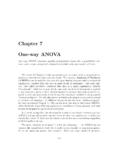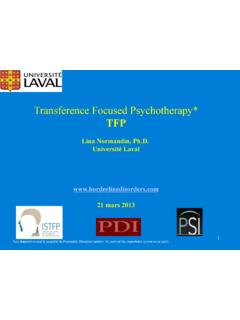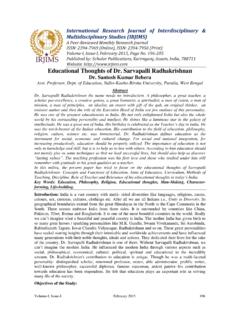Transcription of Nietzsche and Aristotle in contemporary virtue ethics
1 Nietzsche and Aristotle in contemporary virtue ethics Ethical Theory and Practice - Final Paper 3 February 2005 Tibor Goossens - 0439940 CS ethics 1A - WBMA3014 Faculty of Philosophy - Utrecht University Nietzsche and Aristotle in contemporary virtue ethics Goossens 2 Table of contents 1. Introduction and research question .. 3 Introduction .. 3 contemporary virtue ethics : agent-based and agent-prior positions .. 3 Aim and research 4 2. Alasdair MacIntyre: rediscovering Aristotle .. 5 Nietzsche s critique on Enlightenment 5 Why Nietzsche is not an alternative.
2 5 Rehabilitating 6 3. Rosalind Hursthouse: virtues and human 7 Human flourishing and 7 Nietzsche : strong 7 Different sets of virtues .. 8 Human nature as harmonious .. 8 4. Christine Swanton: strength and virtue .. 9 An agent-based 9 Strength conceptions of virtues : altruism as an excess of life .. 9 Expressing strength well .. 9 5. Conclusions .. 11 Objectivity .. 11 Strong 11 Nietzsche and Aristotle in the contemporary virtue -ethical debate .. 11 6. References .. 12 Nietzsche and Aristotle in contemporary virtue ethics Goossens 3 Nietzsche and Aristotle in contemporary virtue ethics 1.
3 Introduction and research question Introduction Kantian, utilitarian, and natural law- versions of modernistic ethics have flourished several decennia after the Second World War. Around 1980, ethical theory became concerned with critique on Enlightenment philosophy. This critique was a result of its technocratic tendencies and its focus on the subject as human being, apart from his particular bonds, and consisted of a double opposition. First, there is a neo-Nietzschean tendency, which regards rationalisation as a thread for vital subjectivity. It exposes moral truths as contingencies, determined by coincidental balances of power.
4 Second, there is a neo-Aristotelian tendency, which regards reason as an expression of a particular culture. From this perspective, morals are concerned with fundamental ways of life, passed on by a group ethos1. contemporary virtue ethics : agent-based and agent-prior positions virtue ethics is one of the three major approaches in present normative ethics . It differs from Enlightenment ethics , which emphasizes duties, rules or the consequences of actions2, because of its emphasis on moral character. Therefore, virtue ethics is agent-focused: it concerns the virtuous individual and the inner traits, dispositions and motives, which qualify it as being virtuous.
5 Some forms of virtue ethics do allow for moral rules or laws, but thread them typically as derivative or secondary factors3. Within virtue ethical accounts, a distinction can be made between agent-based and agent-prior approaches4. An example of agent-based virtue ethics can be found with Nietzsche , who regards the agent himself as the foundation of virtue , instead of human flourishing. More recently, Christine Swanton has developed an approach, which allows for different sets of virtues5. What counts as a virtue can also be judged by its relation to a specific conception of human flourishing ( eudaimonia ).
6 Such an approach counts as agent-prior: character evaluations are grounded in a view of eudaimonia, and therefore are not regarded as fundamental themselves. This kind of neo-Aristotelian virtue ethics is defended by Alasdair MacIntyre, but also by Rosalind Hursthouse6, who has developed a naturalistic approach. 1 De Wachter, 2000; p. 87 2 Hursthouse, 2003 3 Slote, 2001; 4 Slote, 2001; 5 Swanton, 2003 6 Slote, 2001: Nietzsche and Aristotle in contemporary virtue ethics Goossens 4 Aim and research question In the contemporary virtue -ethical debate, and important discussion concerns the ways in which virtues can be grounded.
7 Two important alternatives are already mentioned: the foundation of virtues either in the agent or in human flourishing. This paper aims to clarify the ways in which these two alternatives are handled by a selection of three distinctive philosophers in contemporary virtue ethics . Therefore, this paper examines the ways in which Nietzschean and Aristotelian strategies to ground virtues are being handled in the virtue ethical approaches of MacIntyre, Hursthouse, and Swanton. A perspective will be regarded Nietzschean, when the central viewpoint has originated from Nietzschean thought, in particular agent-based views.
8 A perspective will be considered Aristotelian when ideas are explicitly and recognizably derived from Aristotelian thought, in particular agent-prior views. Nietzsche and Aristotle in contemporary virtue ethics Goossens 5 2. Alasdair MacIntyre: rediscovering Aristotle Nietzsche s critique on Enlightenment morality For MacIntyre, modern moral utterance and practice can only be understood as a series of fragmented survivals from an older past. The problems that modern ethical theorists cope with are the result of these diverse fragments. They will remain insoluble until this fragmentation is well understood7.
9 In After virtue (1981), MacIntyre states that the failure of Enlightenment morality has been perceived most clearly by Nietzsche . The primary question of Enlightenment philosophers concerned what rules to follow, and why one has to obey them. Nietzsche showed that the Enlightenment project failed to provide a true objective basis for morality, and was neither capable to answer the question what kind of person one ought to become. The latter is a consequence of the removal of Aristotelian teleology from the moral world8. In Enlightenment morality, rules are the primary concept of the moral life, and therefore justification of virtues depends upon prior justification of rules and principles.
10 Both Nietzsche and Aristotle agree on an alternative approach: they suppose that we need to attend to virtues in the first place, in order to understand the function and authority of rules. Why Nietzsche is not an alternative According to MacIntyre, Nietzsche s historic achievement lies in understanding more clearly that appeals to objectivity were in fact expressions of subjective will of those who are too weak and slavish to assert themselves with archaic and aristocratic grandeur 9. He despised the idea of basing morality on inner moral sentiments, on conscience, or the Kantian categorical imperative.







